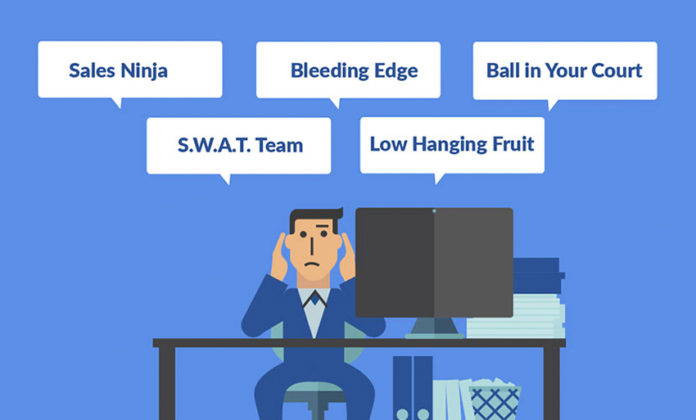Effective sales pitches are a vital part of any organization’s path to building a loyal customer base and growing its business. The role of the sales team is to generate new business and ensure lead conversion. In fact, in your average organization, 13% of sales representatives bring in 87% of the revenue. That speaks to the importance of effective sales pitches.
Anyone who has worked in a call center would be familiar with the plethora of abbreviations used in the environment. Sooner or later, though, the same old sales jargon is heard over and over again, becoming a tiresome cliche. Bear in mind these five cliches and their potential alternatives to pave your way in becoming the top sales rep at your company!
The All-Powerful “Sales Ninja”
Business and ancient martial arts share various traits, such as a focused mindset and the making of strategic moves. It is no coincidence then that business speak can be associated with martial arts metaphors. One of these metaphors, “Sales Ninja”, typically refers to someone very skilled in their line of work. Instead of a shrouded assassin holding a samurai sword, it’s an overworked sales rep clutching their phone and gesturing vigorously. A call center employee might refer to another co-worker as a Sales Ninja because they bring in the most clients. It’s all good fun to call your co-worker a Sales Ninja in jest at the office but when in a more serious business meeting, stick with “Sales Expert”.
“Bleeding Edge” Technology
Sometimes to emphasize that the product on the market is the latest version of its kind, salespeople go beyond saying it’s “innovative and game changing” and resort to gore inspired imagery by calling it “bleeding edge”. Don’t do it. Customers don’t need a Freddy Krueger nightmare, they want to be convinced that your product is modern and highly competitive.
While the phrase itself is a legitimate idiom, such an exaggeration treads along the thin line between funny and ridiculous. Using an alternative phrase such as “cutting edge” or “groundbreaking” to describe your product is far more suitable than proffering horror film-esque night terrors. You’ll also make a more professional impression on your potential client.
Get Ready for the “Ball in Your Court”
Sales agents are common culprits of this particular sports-related expression.This bit of jargonrefers to a person whose responsibility is to make the next decision. Salespeople use this phrase to signal to the customer that it is up to them to make the best decision for their company.
You might call a client and shoot off on your sales pitch and end it by informing the client that the “ball is in your court now”. This doesn’t do much except come across as implicitly pressuring the client into making a decision.
According to McKinsey research, the consumer decision process involves the evaluation of potential alternatives to the offered product before they make a selection. Two thirds of respondents in a Zendesk survey reported looking at the firm’s online reviews before making a purchase decision. If anything, making sure you understand the client’s product needs and concerns is more important than scoring an immediate sale or losing a customer using pressure tactics or phrases like the one above. After all, collaboration and listening are two of the top factors that favor top B2B sales reps.
Instead, schedule a follow up call with the client later in the week and email them immediately to reiterate the key points made in the initial conversation. Then make sure you make a task to follow up. Not only are you providing them the autonomy to do their own additional research but you’re showing them your desire in building good rapport and your reliability by following up.
Break Out the “S.W.A.T. Team”
This cliche brings to mind a cohesive team and strategy for your clients. Sales staff use this phrase to encompass in a nutshell the expert team that will be assembled. Its versatility is probably why we are guilty of using this phrase often. You’re demonstrating to the customer that your team is well equipped to deal with any risk related to the job that needs to be done. On top of that, you’re simultaneously informing the client that your company is exceptionally thorough and prompt with their work. Of course, your team’s efficacy isn’t exactly in response to a life or death situation, but the message gets through. An alternative to using this catch-all would be to highlight previous projects similar to the client’s needs gap. Explaining how your team managed the risks in those projects would go a long way in exhibiting the expertise you’re selling to them.
Grab the “Low Hanging Fruit”
In a business conversation, ‘low hanging fruit’ refers to the easiest tasks to complete. You might use it in a sales pitch about potential steps to solve a client’s shorter term targets, “these products will definitely address the low hanging fruit we were discussing.” Firstly why are we bringing fruits into a business conversation? Secondly, just use the alternative “quick win,” it gets the point across more simply. And you get the benefit of not needing to resort to a cliche which the customer might cringe at.
We all love breaking out the cliches occasionally, but remember to stay professional and use the most effective language to engage a customer. Cliches exist because they’re commonplace and simple to use. Just don’t over do it!





